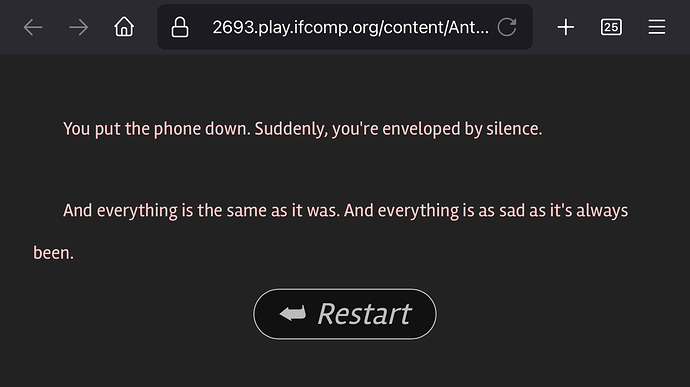The Tin Mug
Everything begins and ends with nostalgia.
I love how the web interface emulated the user interface of a text parser interpreter from, perhaps, the late 1990s, down to the functionality of saving game files. The writing and tone of the narrative all seemed appropriately aimed at a approving rendition of a magic folktale type of story, but I can’t imagine that the game could have been made with intent for it to be played by actual young children in this present decade. I like the fact that this game unites its nostalgic mimicry of the old parser IF experience on the desktop with its sincere application of a children’s folktale narrative genre. This shows a pretty high ranking of the cultural value of IF and of computers in general.
I played the game on my mobile device - the small iPhone from 2020. It scaled down well to the traditional smartphone screen surprisingly well, there was only a little bit of bleed on the side of the rendered faux-status line and sometimes difficulty selecting the bottom option from the list of choices. It wasn’t at all unplayable, even if not the most ideal context for experiencing this game.
I don’t know what authoring system or engine this game uses. I’m just dropping back, and I’ve been out of the loop. It’s neither ChoiceScript nor Twine, and I’m curious about the relationship between this game’s sophisticated HTML-rendered GUI and the authoring system.
I can’t speak much to the interactivity or to the significance of the choices, although I did perform a second speed run after I reached the ending. (An ending? I’m not sure, but I’m guessing there is probably only one.)
As to the story, specifically, I appreciate the character of the intuitive old man who is clued in to the childlike magic. It takes creative insight to see significance in an everyday object like a spoon, and perhaps the oldschool aesthetic serves to show our old computer culture and our nostalgic memories of IF community past as a magic piece of tradition.
The Grown-Up Detective Agency
Nostalgia.
Here in the guise of a lowkey cynical, pre-emptively burnt out young adult compelled by time-space anomaly to re-examine her previous life as an idealistic adolescent, nostaliga takes us for a tour of contemporary Toronto with a full complement of comparisons between the post-COVID present and the city as it was in 2013. The portrayal of Toronto is one of my favorite qualities of this hypertext story, including its creative use of Creative Commons photography. CC resources are a great way to participate in the best kind of Internet culture, and the rest of this game references and otherwise evokes the history of Internet culture throughout the living memory of contemporary generations.
The writing is good spirited toward everyone, where it could have easily ventured into potentially toxic territory. Part of looking back on 2013 from 2022 is reflecting on the fact that controversies and insults that plagued fandoms and forums in these intervening years were intrinsically connected to other things that were happening culturally in a broader context.
Toronto is an interesting place with plenty of status for the demographic of Millennial indie creative types, and perhaps post-Millennials. I have never been there despite living in the greater geographic region (on the other side) and enjoyed the anecdotes about the neighborhoods of the city and about weird quirks like miniature park areas. But the descriptions of the city left me wanting more – not necessarily more information, which I could get easily enough – but more connection, more relevance. I wanted to see how Bell interacts with Toronto and lives the life of Toronto. I want to know what it’s like to grow up in Toronto and how Toronto makes an impression on the psyche of its longtime residents.

